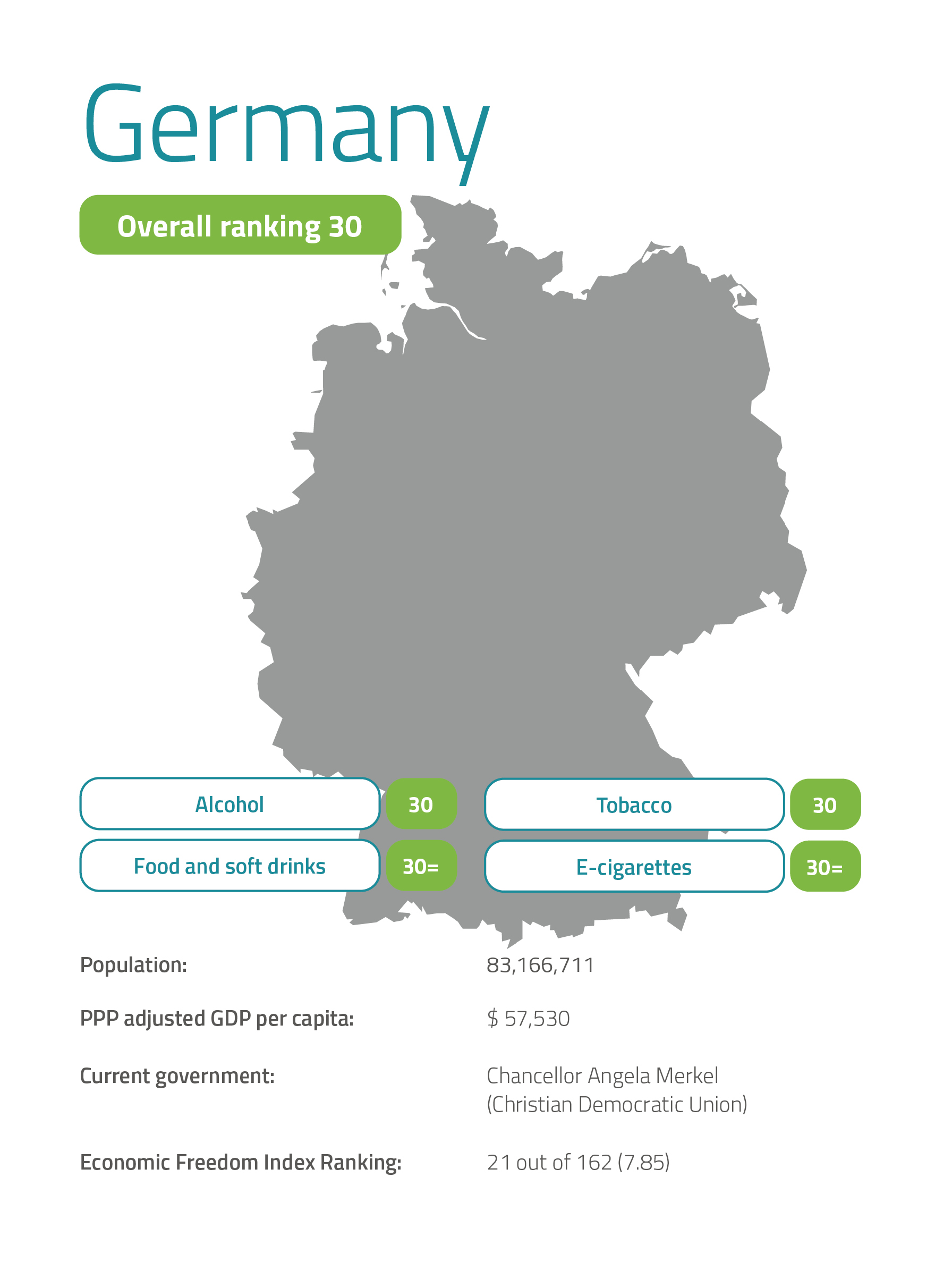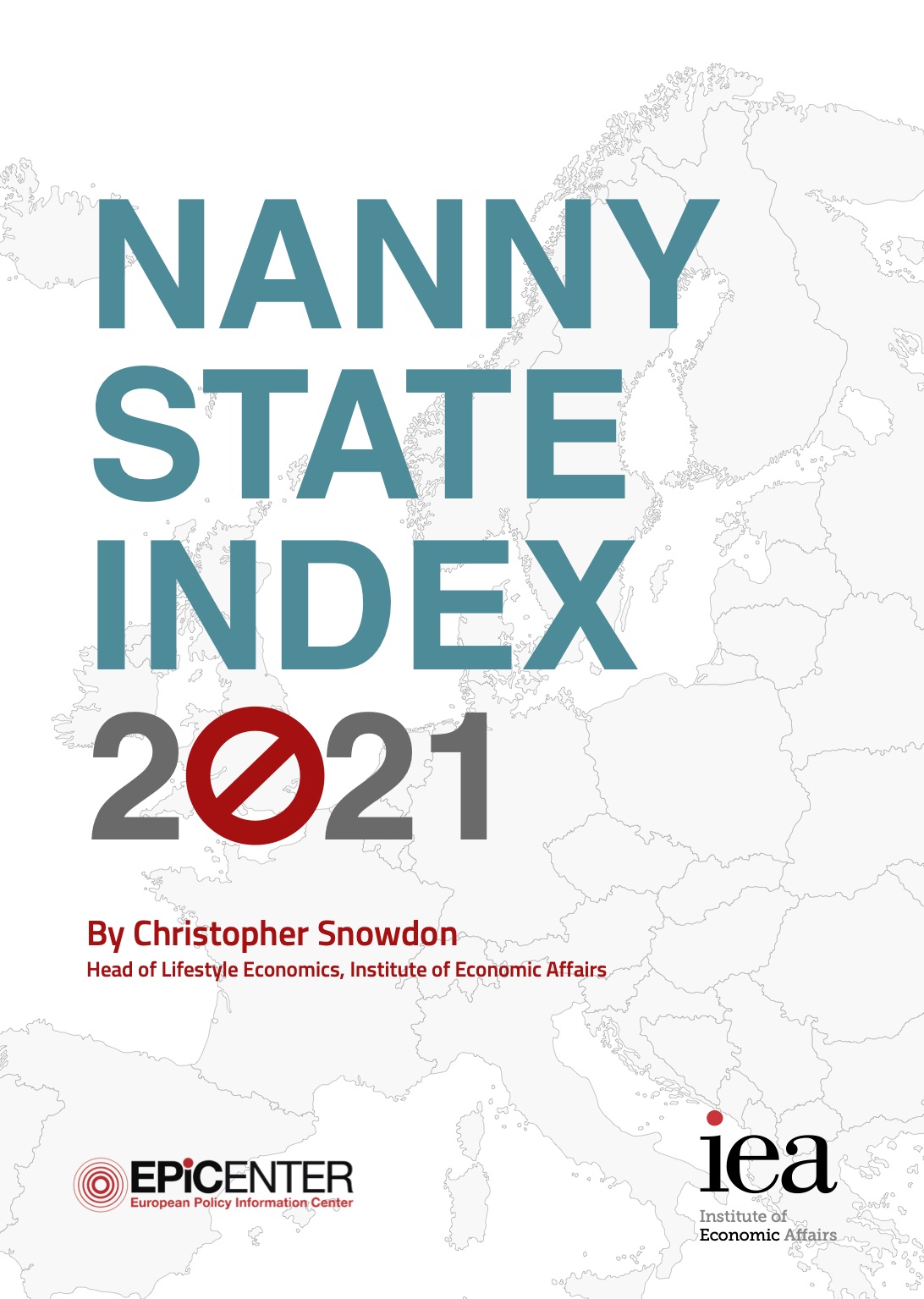
Germany is still the best country to drink, smoke, vape and eat in the EU. Remarkably, it has the lowest score in every category, although the honours are shared with some other countries when it comes to e-cigarettes and food/soft drinks.
Germany has no tax on e-cigarette fluid, sugar or wine. Taxes on beer, spirits and tobacco are among the lowest in Europe after adjusting for income and although smoking restrictions vary by region, the laws are generally more tolerant than in other European countries.
E-cigarettes can be sold and used without restriction. Cross-border sales are legal and e-cigarette products can be advertised within the confines of EU legislation. Only three of the sixteen states have a comprehensive smoking ban (North Rhine-Westphalia, Bavaria and Saarland). The rest have significant exemptions based on the size of the premises, the status of the establishment (e.g. private clubs) and whether or not food is served. The result is that in the majority of German states some bars have a designated smoking room at the minimum. Smoking and vaping is forbidden on public transport.
Unusually for an EU country, Germany permits a significant amount of tobacco advertising, but this will be reduced in the coming years. Plans are afoot to restrict tobacco advertising outdoors and limit cigarette commercials in cinemas to films that are aimed at an adult audience. By 2024, these rules will also apply to e-cigarettes and heated tobacco products. Point of sale advertising will still be legal.
Germany has no nanny state policies on food and soft drinks, but the government has entered a ‘voluntary’ agreement with industry to reformulate food products to achieve a reduction in sugar consumption of at least 10 per cent by 2025.
Germany allows alcohol advertising in all its forms, including on television after 6pm, and there is no statutory closing time for bars.
With thanks to Prometheus Institut
About
The Nanny State Index (NSI) is a league table of the worst places in Europe to eat, drink, smoke and vape. The initiative was launched in March 2016 and was a media hit right across Europe. It is masterminded and led by IEA’s Christopher Snowdon with partners from all over Europe.
Enquiries: info@epicenternetwork.eu
Download Publication

Previous version: 2019
Categories
About the Editor
Christopher Snowdon is the head of Lifestyle Economics at the Institute of Economic Affairs. His research focuses on lifestyle freedoms, prohibition and policy-based evidence. He is a regular contributor to the Spectator, Telegraph and Spiked and often appears on TV and radio discussing social and economic issues.
Snowdon’s work encompasses a diverse range of topics including ‘sin taxes’, state funding of charities, happiness economics, ‘public health’ regulation, gambling and the black market. Recent publications include ‘Drinking, Fast and Slow’, ‘The Proof of the Pudding: Denmark’s Fat Tax Fiasco’, ‘A Safer Bet’, and ‘You Had One Job’. He is also the author of ‘Killjoys’ (2017), ‘Selfishness, Greed and Capitalism’ (2015), ‘The Art of Suppression’ (2011), ‘The Spirit Level Delusion’ (2010), ‘Velvet Glove, Iron Fist’ (2009).
Germany 2021

Germany is still the best country to drink, smoke, vape and eat in the EU. Remarkably, it has the lowest score in every category, although the honours are shared with some other countries when it comes to e-cigarettes and food/soft drinks.
Germany has no tax on e-cigarette fluid, sugar or wine. Taxes on beer, spirits and tobacco are among the lowest in Europe after adjusting for income and although smoking restrictions vary by region, the laws are generally more tolerant than in other European countries.
E-cigarettes can be sold and used without restriction. Cross-border sales are legal and e-cigarette products can be advertised within the confines of EU legislation. Only three of the sixteen states have a comprehensive smoking ban (North Rhine-Westphalia, Bavaria and Saarland). The rest have significant exemptions based on the size of the premises, the status of the establishment (e.g. private clubs) and whether or not food is served. The result is that in the majority of German states some bars have a designated smoking room at the minimum. Smoking and vaping is forbidden on public transport.
Unusually for an EU country, Germany permits a significant amount of tobacco advertising, but this will be reduced in the coming years. Plans are afoot to restrict tobacco advertising outdoors and limit cigarette commercials in cinemas to films that are aimed at an adult audience. By 2024, these rules will also apply to e-cigarettes and heated tobacco products. Point of sale advertising will still be legal.
Germany has no nanny state policies on food and soft drinks, but the government has entered a ‘voluntary’ agreement with industry to reformulate food products to achieve a reduction in sugar consumption of at least 10 per cent by 2025.
Germany allows alcohol advertising in all its forms, including on television after 6pm, and there is no statutory closing time for bars.
With thanks to Prometheus Institut

 Austria
Austria Belgium
Belgium Bulgaria
Bulgaria Croatia
Croatia Cyprus
Cyprus Czech Republic
Czech Republic Denmark
Denmark Estonia
Estonia Finland
Finland France
France Germany
Germany Greece
Greece Hungary
Hungary Ireland
Ireland Italy
Italy Latvia
Latvia Lithuania
Lithuania Luxembourg
Luxembourg Malta
Malta Netherlands
Netherlands Norway
Norway Poland
Poland Portugal
Portugal Romania
Romania Slovakia
Slovakia Slovenia
Slovenia Spain
Spain Sweden
Sweden Turkey
Turkey United Kingdom
United Kingdom
















